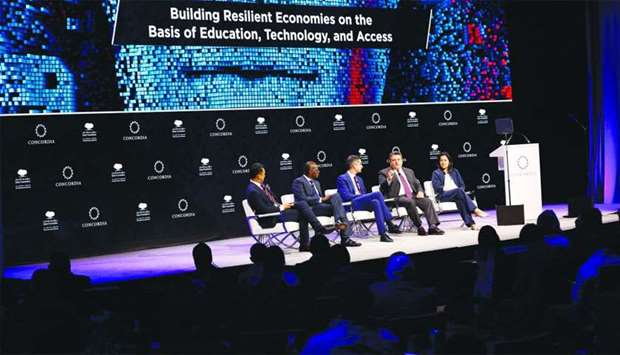Technology is not a “magic solution” for the world’s educational ecosystems and must instead be a gateway for people to innovate using their initiative, the head of Qatar Foundation’s ( QF) global education think-tank has told a leading global affairs forum in the US.
Speaking at the 2019 Concordia Annual Summit in New York City – one of the world’s largest gatherings of decision-makers and thought-leaders from government, business, and non-profit organisations – Stavros N Yiannouka, CEO of the World Innovation Summit for Education (WISE) also explained why education programmes across different sectors have to be “weaved together” rather than operating independently if nations are to offer the best learning experiences.
The Summit also saw HE the Deputy Prime Minister and Minister of Foreign Affairs Sheikh Mohamed bin Abdulrahman al-Thani, speak on ‘Rethinking the Role of Small State Actors in International Politics’; and HE Hassan al-Thawadi, Secretary General of the Supreme Committee for Delivery & Legacy, speak about ‘Sport’s Transformational Power: The First FIFA World Cup in the Middle East’.
As a programming partner of Concordia, QF organised a panel discussion titled ‘Building Resilient Economies on the Basis of Education, Technology, and Access’, which saw Yiannouka outline a research report produced by WISE – an initiative of QF – into learning ecosystems and how new ideas that move education away from purely conventional models can be brought into play.
“QF has been involved in a 25-year journey to build a local education ecosystem that goes beyond formal education,” he told the Concordia audience. “It started with K-12 education and has grown to encompass a very rich ecosystem that includes a national library, research centres, branch campuses of international universities, sporting facilities, think-tanks, and a science and technology park.
“The idea is to weave the whole into something that is greater than the sum of its parts.”
Yiannouka said the WISE report discussed at the Concordia session had revealed that effective education ecosystems have “strong philanthropic or private sector involvement in funding and governance”, and programmes that “are comprehensive and envision new roles and organisations whose explicit role is to weave difference pieces together”.
“If you want to supplement formal education with active museum, library, and sporting programmes, it’s not enough to just have them independently developing programmes,” he said.
“And while you have technology playing a part, it is not in itself a provider of a magic solution. What it can do is enable access to programmes and information. But what is just as important is a willingness to experiment and innovate in real time and adjust programmes as you discover new information about whether they work or not.”
During the Summit, WISE hosted three roundtable events focusing on Africa’s role in the ‘global education revolution’, bridging gaps between education and the job market in Latin America, and the use of Artificial Intelligence in combating child abuse.

